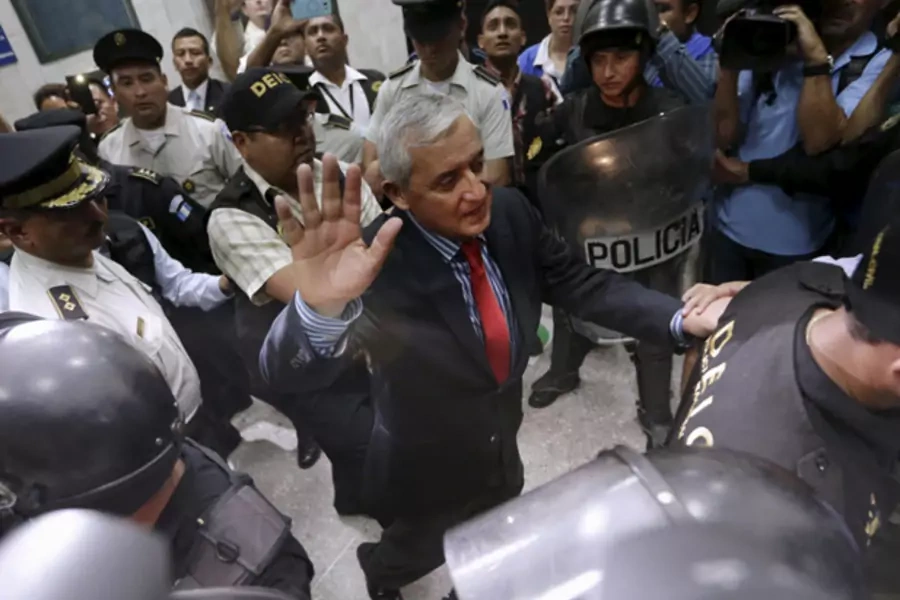Taking on Corruption in Latin America

More on:
2015 is shaping up to be the anti-corruption year for Latin America. After resigning last week in the face of a growing corruption scandal, Guatemalan President Pérez Molina now faces trial and potentially jail. Investigations into government corruption have disrupted politics as usual in Brazil, Chile, and Mexico, while scandals continue to unfold in Argentina and Panama.
The Dickens quote "it was the best of times, it was the worst of times” is perhaps too dramatic, but differences in how the cases are playing out across the region are quite striking. In Brazil and Guatemala, wide-ranging investigations have led to prosecutions and convictions of many of the nations’ most connected political and economic elites. In contrast, in Mexico, President Peña Nieto, the first lady, and the finance minister were recently cleared of conflict of interest allegations, and in Chile, President Bachelet’s son, Sebastián Dávalos, has so far evaded criminal charges in an influence-peddling scheme.
The divergent outcomes are due in part to the differing nature of the alleged crimes. In Brazil and Guatemala, officials are charged with embezzling public funds. Through the use of wiretaps, email monitoring, and financial forensics, Brazilian prosecutors traced the flows of hundreds of millions of dollars that private companies overcharged the state-led energy company Petrobras for construction and service work, and then distributed among themselves and into political party coffers. And the Guatemalan president and the vice president are accused of running a customs fraud operation, pocketing tens of millions of dollars in import duties.
The Chilean and Mexican cases on the other hand are about profiting from political access. In Chile, Caval, a company half-owned by Bachelet’s daughter-in-law, received a $10 million loan from Andronico Luksic through his Bank of Chile the day after Bachelet was reelected president. Her daughter-in-law and son then used the money to flip real estate, using insider information to buy land that was expected to quickly soar in value when the local government reclassified it for commercial development—reaping $5 million in profit. In Mexico, the president, first lady, and finance minister purchased homes from Grupo Higa, a construction conglomerate awarded hundreds of millions of dollars in public works contracts. The alleged links in both cases between favorable financial terms and political favors—and wrongdoing—are more difficult to prove than the embezzlement schemes.
The divergent outcomes also reflect the importance of independent and tenacious prosecutors. Brazilian attorney general Rodrigo Janot and his team have gone after dozens of high profile suspects, including Eduardo Cunha, head of Brazil’s lower house of Congress; construction magnate Marcelo Odebrecht; and former President Lula da Silva, despite pushback from many economic and political leaders (President Rousseff has repeatedly supported the investigations). The enterprising Guatemalan attorney general Thelma Aldana has found a sophisticated and willing partner in the UN-backed and independent International Commission against Impunity in Guatemala (CICIG), using its ten years of experience building corruption cases to take on the nation’s highest ranking officials.
This hasn’t been the case with Chile’s and Mexico’s more halting and limited prosecutorial investigations. In Chile, prosecutors have been slow in advancing the case against the Bachelet family, hindered by Dávalos ordering his computer erased before leaving the presidential offices at La Moneda. No whistleblowers have come forward; his former coworkers maintain their silence.
In Mexico, the federal comptroller, an office created by and reporting to the president, led the investigation and limited its scope from the beginning. The comptroller cleared the president, the first lady, and the finance minister after determining that the property transactions pre-dated the administration and contract terms weren’t changed once they took office. In finance minister Videgaray’s case, the comptroller further decided that the intent to purchase (which occurred before he assumed his current office) mattered more than the signing and notarizing of documents. The investigation revealed the actual closing occurred months later and the cashing of the check didn’t happen until a few days before the Wall Street Journal broke the story.
As Latin American nations work to break out of the middle-income trap, and struggle to grow in the face of global economic headwinds, the ability to take on corruption will increasingly matter. Corruption favors connections over quality, stifles entrepreneurship, and scares away foreign direct investment. This seems to be a lesson two of Latin America’s most open economies have yet to learn.
More on:
 Online Store
Online Store